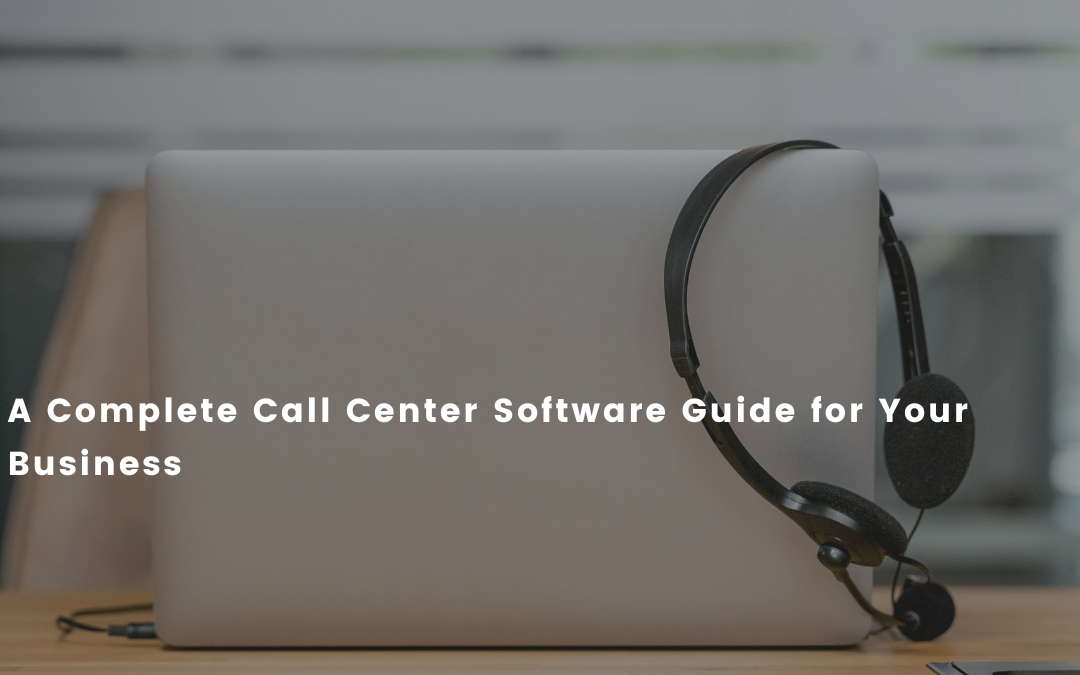Even with emails, chats, and social media at our fingertips, many customers still pick up the phone when they need help. That’s why call center software remains a critical tool—over 76% of consumers say they’d rather speak directly on a call with a support agent, especially when the issue is complex or time-sensitive.
With rising call volumes and higher customer expectations, businesses are pressured to respond faster, resolve issues better, and keep costs low.
The right call center software for your business can simplify how your team handles calls, cut down wait times, and boost the resolution rate, leading to happier customers and more efficient teams.
In this guide, we’ll walk you through everything you need to know before choosing a call center solution for your business. Let’s start right off.
Understanding call center software
Call center software is a technological solution designed to streamline business call operations by managing and automating aspects of inbound and outbound calls.
The global contact center market, which heavily relies on such software, was valued at $340 billion in 2020. It is projected to reach $496 billion by 2027, reflecting its critical role in modern customer service strategies.
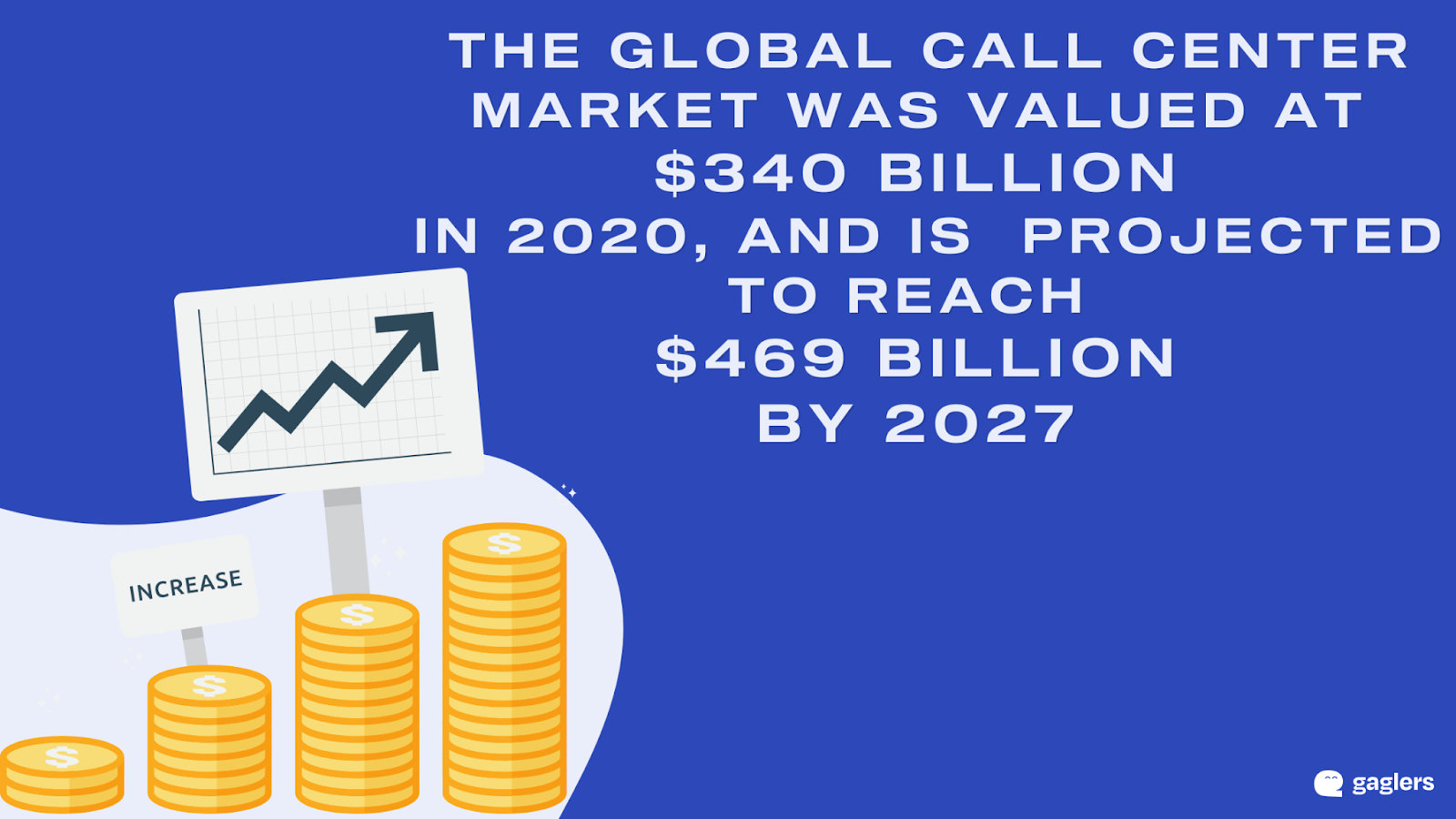
From IVR systems that guide callers quickly, to CRM integrations, automated dialers, and AI-powered analytics—modern call center software gives teams the tools to reduce wait times, personalize conversations, and make smarter decisions.
The main types of call center software
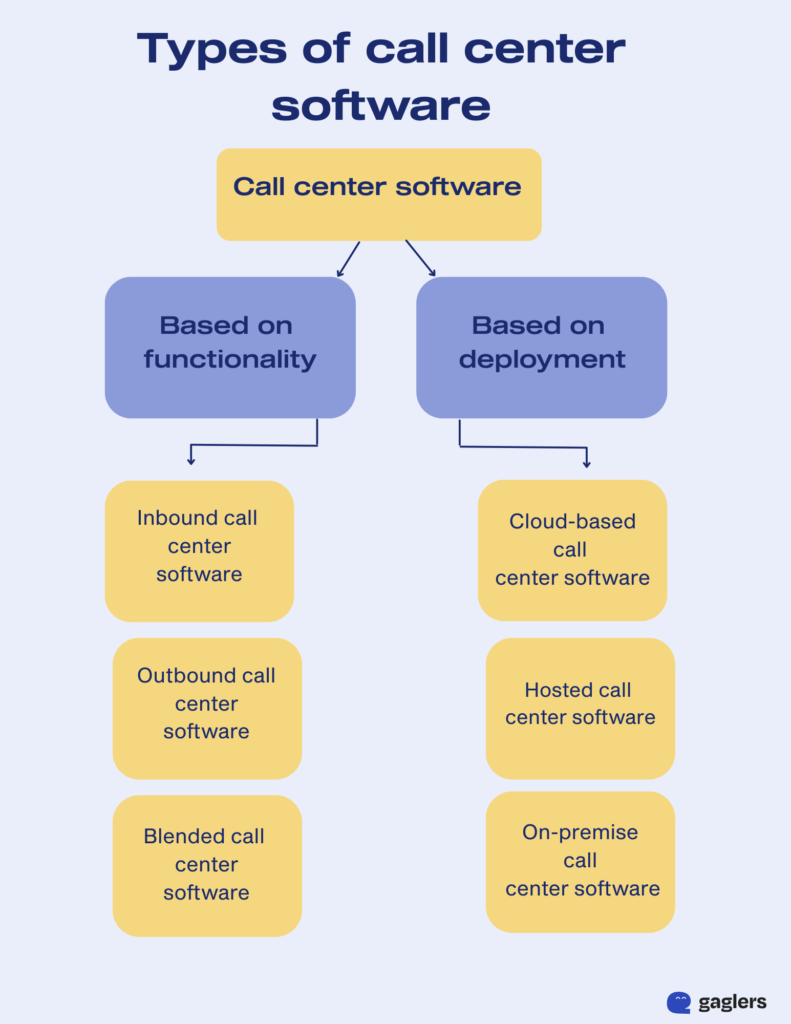
Call center software comes in various types, each designed to suit specific business goals—customer support, sales, or campaign outreach. Whether you’re a startup or an enterprise, selecting the right type of call center software for business can make or break your customer engagement strategy.
Let’s break it down by functionality and deployment type for better understanding.
1. Based on functionality
Call center solutions are typically categorized by the calls they handle—inbound, outbound, or blended.
| Type | What does it do? | Best for |
| Inbound call center software | Handles incoming calls from customers or prospects. Agents respond to queries or provide support. | Customer service, tech support, and feedback collection |
| Outbound call center software | Facilitates outgoing calls to leads or customers. Used for sales, surveys, follow-ups, etc. | Telemarketing, sales outreach, debt collection |
| Blended call center software | Supports both incoming and outgoing calls. Agents can switch roles based on call traffic. | Multi-purpose campaigns with fluctuating call volume |
2. Based on deployment
Deployment models determine how your call center software is hosted and maintained. Here’s a breakdown:
| Type | Features | Pros | Cons |
| Cloud-based call center software aka virtual call centers | Hosted on third-party cloud servers (like AWS or Google Cloud). Fully online and scalable. | ✅ Low setup cost ✅ Remote access ✅ Easy to scale | 👎 Internet-dependent 👎 May limit deep customization |
| Hosted call center software | Hosted on vendor-owned servers but separate from cloud providers. Subscription-based. | ✅ No infrastructure needed ✅ Vendor-managed | 👎 Limited customization 👎 Potential vendor lock-in |
| On-premise call center software | Installed on your organization’s servers and managed in-house. | ✅ Full control over data and features | 👎 High upfront costs 👎 Needs IT team 👎 High maintenance |
Leading brands like Airbnb, Amazon, and Salesforce rely on virtual call centers to deliver seamless, multilingual support to their global customer base, highlighting how impactful the correct solution can be.
Businesses select call center software solutions based on their requirements. The right call center software for business is crucial for enhancing both customer satisfaction and operational efficiency.
Now that we know the types of call centers, let’s see what the top call center software for business is available in the market!
Must-have features in call center software
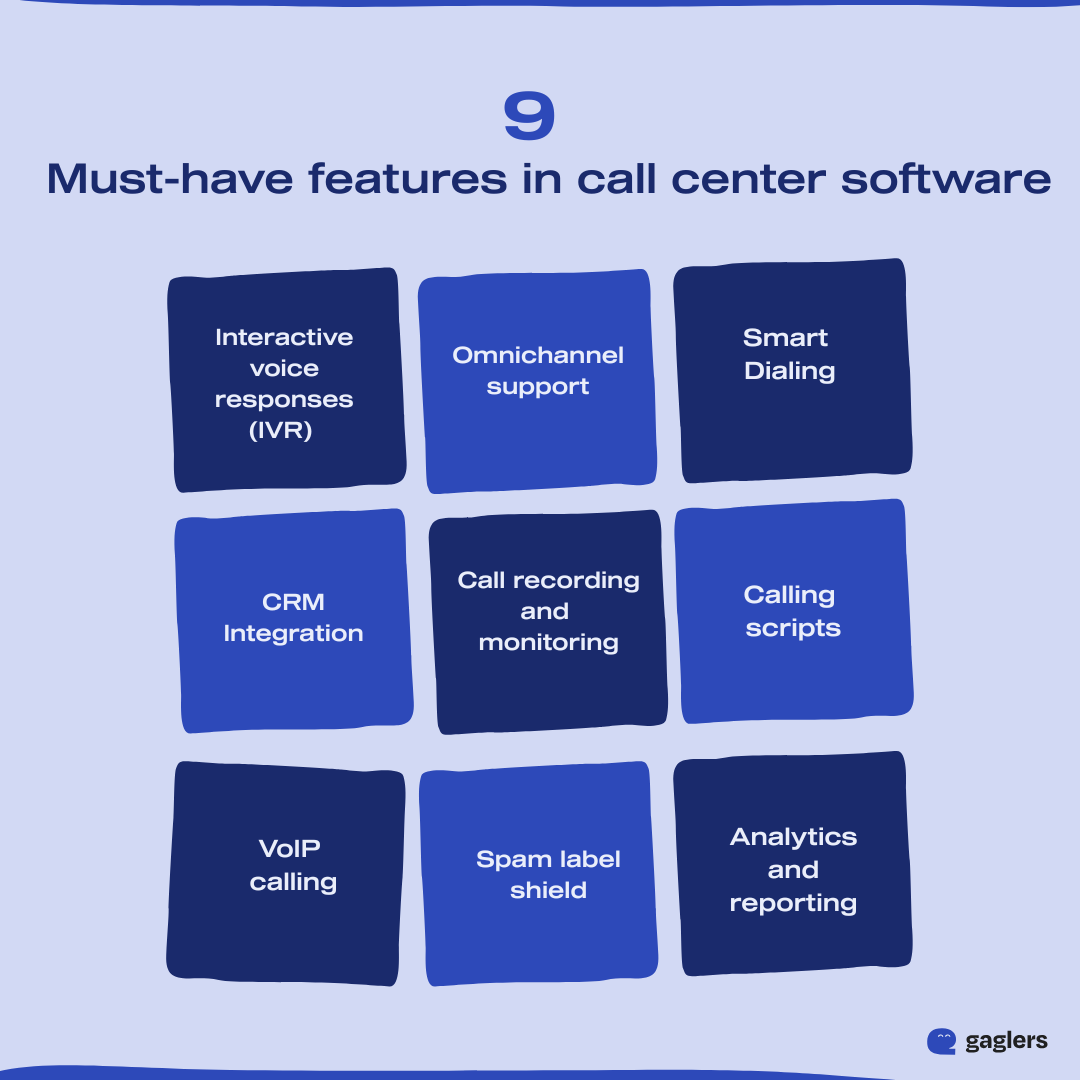
Selecting the right call center software is crucial for enhancing customer interactions and streamlining operations. Below are key features to consider:
1. Interactive Voice Response (IVR)
What it does: IVR systems let customers interact with a phone menu using their voice or keypad—think “Press 1 for support, 2 for billing.”
How it helps: IVR acts like a smart gatekeeper for virtual call centers, especially when call volumes are high. It answers common questions automatically or routes callers to the correct department without needing a live agent.
For example, someone with a billing query can select the option and go straight to the billing team, saving time for both the caller and your staff. The result? Shorter wait times, faster resolutions, and happier customers.
2. Omnichannel support
What it does: Omnichannel support brings all your communication—phone, email, chat, and even social media—into one unified platform.
How it helps: It gives agents a complete view of the customer journey. Say a customer at an online retail store messages on Instagram about a delayed order and follows up later by phone.
Your agent can see their full history, pick up right where they previously left off, and resolve the issue without asking them to repeat themselves. That’s what a seamless, connected experience looks like.
3. Automated dialers
What it does: Auto dialers in call center software for business help you make every call count by using dialing modes that match your company’s needs—whether you’re going for speed or personalization.
How it helps: It reduces idle time, improves agent productivity, and ensures your team connects with more people in less time. Here’s how each dialer works:
- Predictive dialer: Great for high-volume outreach, it uses algorithms to predict agent availability and automatically dials multiple numbers at once—connecting only when a human answers. Perfect for speeding through long lists.
- Power dialer: Designed for more strategic outreach, this mode dials one number at a time, allowing agents to review call center resources like customer history or calling scripts. Perfect for high-value conversations where a personal touch matters.
- Auto dialer: Designed for efficiency, it eliminates the gaps between calls by automatically dialing the following number as soon as one ends—maximizing productivity with zero downtime.
With the right dialer, your team spends more time talking and less time waiting—boosting efficiency, engagement, and results.
4. CRM integration
What it does: Seamlessly integrates your call center software with your CRM, enabling automatic two-way data synchronization.
How it helps: Easily import contact lists for cold calling and automatically sync call outcomes—such as call notes, lead status, and follow-up actions—back to your CRM. This ensures your team always has up-to-date information, allowing for more personalized and effective conversations.
5. Call recording and monitoring
What it does: Call recording tools let you record and listen to calls—perfect for training, quality checks, and staying compliant.
How it helps: Managers can review calls to coach agents, spot what’s working, and ensure standards are met. For example, if a new hire struggles with handling objections, you can use a past call to walk them through, improving agents’ call center skills. It’s like having a play-by-play to boost team performance.
6. Calling scripts
What it does: Calling scripts, or branching scripts, give agents a structured, step-by-step guide to follow during calls—like a GPS for conversations. The script adapts based on the customer’s responses, so agents always stay on track without making spur-of-the-moment decisions and conversations.
How it helps: It’s great for onboarding new agents and ensuring call consistency. Even if someone’s new, they can sound confident and informed.
For example, during a sales campaign, an e-commerce brand can use branching scripts to guide agents in upselling accessories, like offering a laptop bag when a customer asks about a laptop.
7. VoIP calling
What it does: VoIP (Voice over Internet Protocol) lets you make calls over the internet instead of traditional phone lines. It’s cost-effective, flexible, and perfect for virtual call centers with remote teams.
How it helps: By using VoIP, businesses can cut down on hefty phone bills and easily scale their support teams from anywhere. For instance, a multi-location eye care clinic can use VoIP for calls. This helps to streamline the appointment schedule and improve patient communication without overloading their in-house staff.
8. Spam label shield
What it does: This call center software feature for business prevents your outbound calls from being flagged as “spam” by carriers, ensuring your caller ID stays clean and recognizable.
How it helps: If your number shows up as “Spam Likely,” people won’t answer—even if it’s a legitimate call. Spam label shield protects your reputation, boosts call answer rates, and keeps communication flowing smoothly.
For example, say you’re a real estate agency following up with leads who filled out a form on your website. Those hot leads might ignore the call if your number is marked as spam, thinking it’s just another scamster. With Spam label shield, your number remains trusted—so prospects are more likely to answer, and your agents can close deals faster.
9. Analytics and reporting
What it does: Call center analytics track everything from call volumes and average handle times to agent performance and customer satisfaction.
Why it helps: If you’re looking to fine-tune your call center operations, this is where the magic happens. Analytics help you spot trends, uncover bottlenecks, and see what’s working (and what’s not).
For instance, noticing consistently high handle times? That could signal a need for better training or streamlined processes. With the right insights, you can make smarter decisions and run a more efficient, high-performing call center.
Now Gaglers offers a complete suite of features discussed above—all wrapped into one intuitive platform. It’s built as modern call center software for business and supports both on-site and virtual call centers, making it ideal for growing teams.
Our top picks for call center software solutions
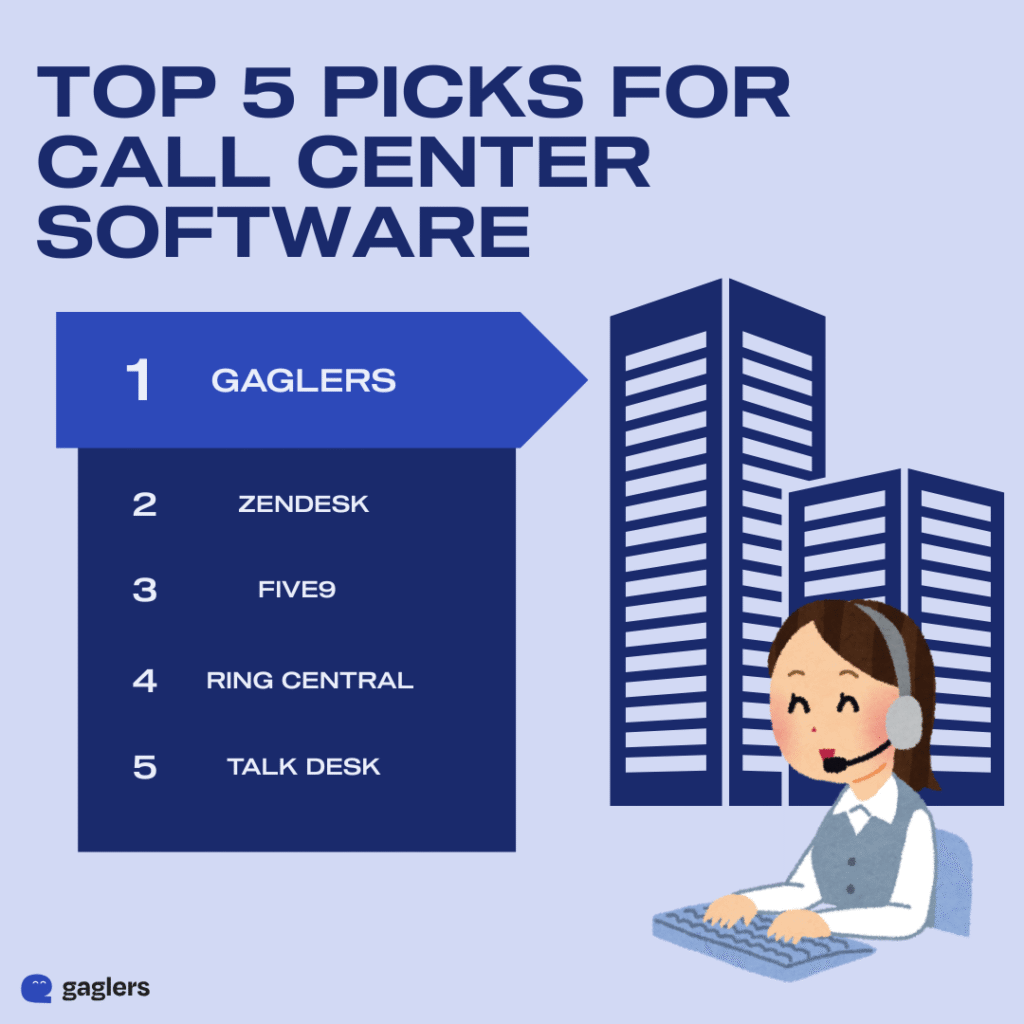
1. Gaglers
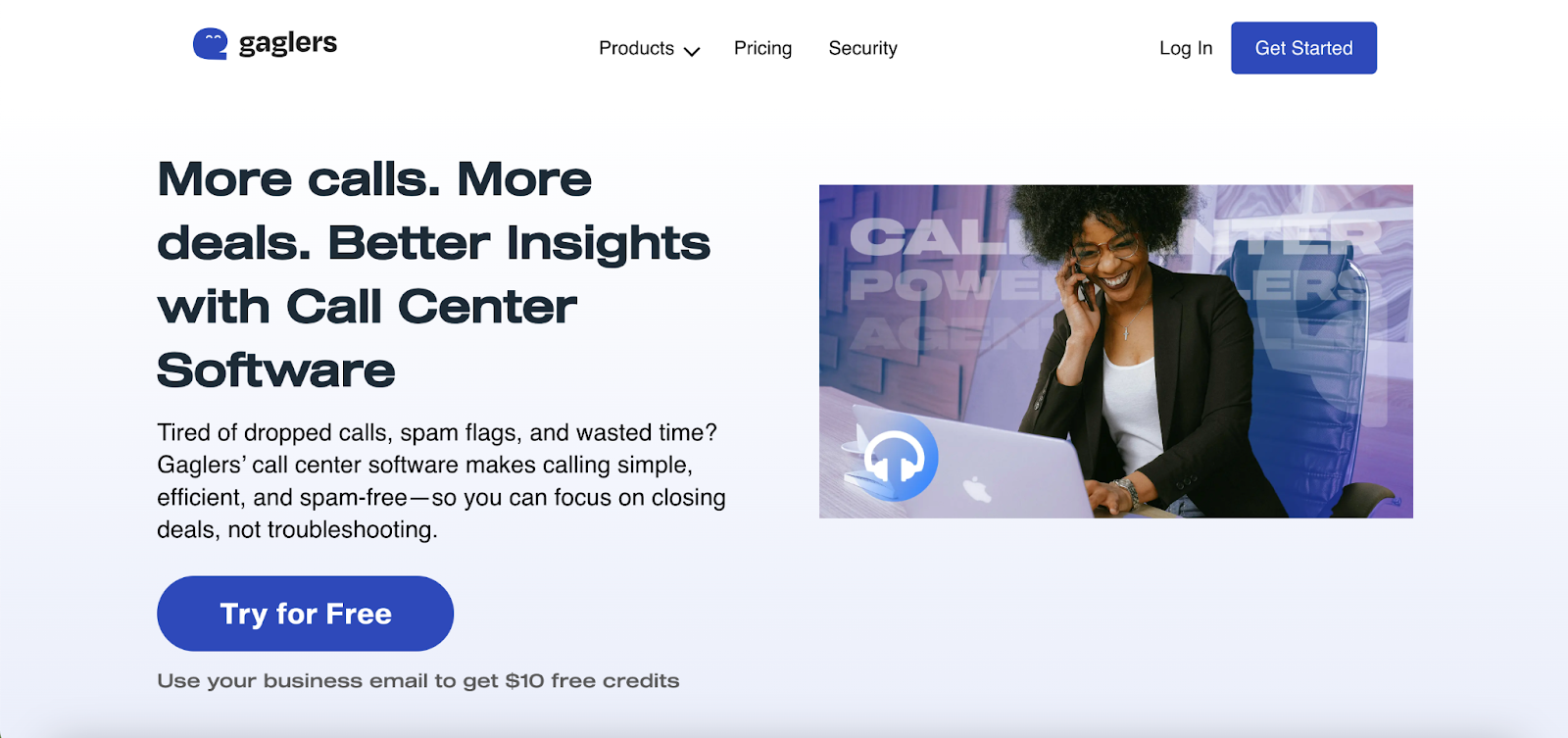
Gagler’s cloud-based call center software is designed to enhance business communications by offering a suite of tools that simplify and optimize the calling process.
This platform aims to reduce dropped calls, avoid spam flags, and minimize wasted time, allowing businesses to focus on closing deals without technical interruptions.
Features:
- Smart automated dialers: Auto-dial numbers to boost agent productivity.
- Omnichannel support: Handle calls, texts, emails, and more in one place.
- Dynamic caller ID: Show local numbers to improve answer rates.
- Spam label shield: Prevent numbers from being marked as spam
- Live call monitoring: Listen to live calls for training or quality checks.
- Workflow automation: Automate routine tasks like follow-ups, reminders etc.
- Adaptive scripts: Real-time scripts that adjust according to the conversation.
- Call center analytics: Track performance with real-time metrics.
- AI call insights: Analyze calls for sentiment and trends.
Pricing: Gaglers offers transparent, pay-as-you-go pricing. For example, outgoing calls via the call center (phone) service are priced at $0.072 per minute.
To learn more about the plans, visit the pricing page now.
Why Gaglers?
Gagler’s call center software enhances business operations by helping sales, marketing, and customer support teams use the smart dialers to make high-value, one-on-one calls—perfect for closing deals or nurturing leads. Paired with other communication channels they offer, lead conversion has never been easier.
With powerful dialers, smart automation, real-time analytics, and seamless CRM integrations, Gaglers goes beyond just calling, making it the #1 choice for businesses looking to scale outreach and close more deals faster. Sign up now
| NOTE: You can use your business email to sign up for Gaglers and get $10 free credits |
2. Zendesk
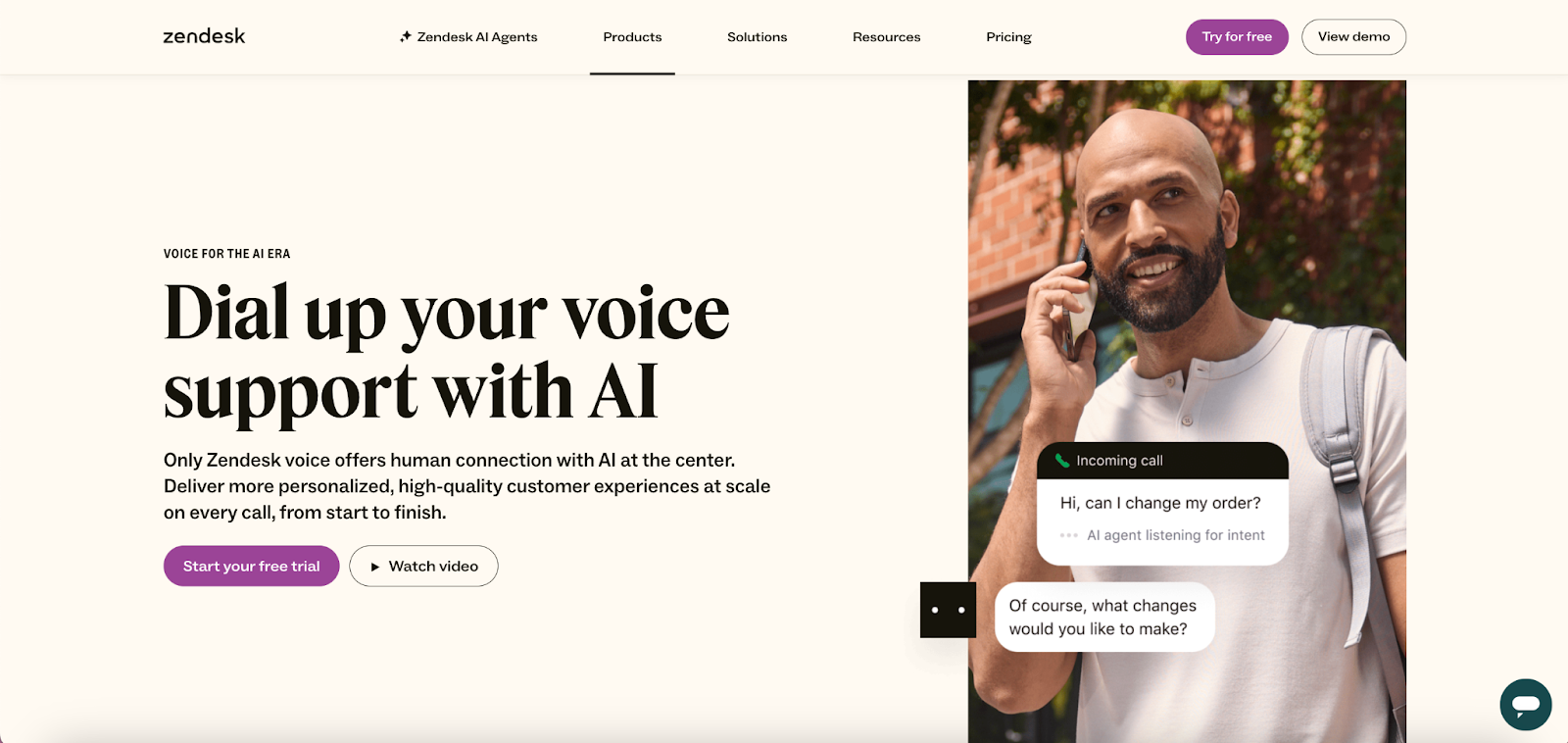
Zendesk offers a comprehensive call center software solution to enhance customer experience (CX) through seamless integration and AI-powered tools. Fully embedded within the Zendesk customer service suite, it enables businesses to provide phone support alongside other communication channels from a unified workspace.
Features:
- Omnichannel support
- AI-powered tools
- Call monitoring and recording
- Live calls (to be launched soon)
- Intelligent call routing
- Call center analytics
Pricing: Zendesk offers a range of plans tailored to different business needs. Here’s a breakdown of their offerings:
- Support team: $19 per agent/month, billed annually
- Suiteteam: $15 per agent/month, billed annually.
- Suite professional: $155 per agent/month, billed annually.
- Suite enterprise: Talk to sales for pricing plans.
| NOTE: Monthly billing rates are higher. |
Zendesk offers add-ons to their packages as well. For more information, check their pricing page.
Why it’s among the best: Zendesk’s versatility and scalability make it suitable for businesses of all sizes seeking to enhance their customer support operations.
3. Five9

Five9 is a cloud-based call center software that helps businesses handle customer interactions more smoothly and efficiently. It’s easy to scale and works with your existing setup. With features like smart call routing, a power dialer, and real-time virtual assistant coaching, it boosts agent performance and customer satisfaction.
Features:
- Intelligent virtual agent
- Call tracking
- Customer profiles
- Smart workforce optimization
- Omnichannel support
Pricing: Five9 has five bundles. Digital (all channels except voice) and Core (voice-only) are each $119/agent/month with a 36-month contract. Premium, optimum, and ultimate include more advanced features—contact sales for pricing.
Add-ons for AI, digital tools, and workforce management are also available.
4. RingCentral

RingCentral’s RingCX is a comprehensive cloud-based call center software solution that enhances customer engagement across multiple channels. It integrates voice, SMS, video conferencing, and over 20 digital channels, including email, live chat, and social media platforms, enabling businesses to connect with customers on their preferred mediums.
Features:
- Omnichannel
- AI assist
- Call center analytics
- Quality management
- Interactive voice agent (IVA)
Pricing: RingCX plans offer unlimited domestic inbound and outbound minutes at $65 per agent per month. For more details, visit their website.
- Talkdesk

Talkdesk offers a comprehensive, cloud-based contact center software that enhances customer interactions through advanced features and seamless integrations. Its platform supports both inbound and outbound communications. Talkdesk integrates with over 70 third-party platforms, including CRM systems like Salesforce and Zendesk, ensuring a cohesive workflow across business tools. This ensures businesses can manage customer engagements effectively.
Features:
- Omnichannel support
- Call center monitoring
- Agent profiles
- AI-powered assistance
- Smart dialers
- Call management app
- Intelligent routing
- Call center analytics
- Integrations
Pricing: Plans start at $85/month. Do check out their pricing page for more details.
Why it’s among the best: Talkdesk’s emphasis on AI and integration capabilities makes it a strong choice for businesses seeking to modernize their contact center operations.
| NOTE: Additional features and industry-specific packages are available at customized pricing. |
Why are businesses turning to call center software?

Let’s answer this question: A robust call center software solution can revolutionize your operations and significantly enhance customer satisfaction.
| Benefit | 💡 Value |
| Agent productivity | Automates tasks so agents focus on talking. |
| Improves customer experience | Faster routing, 74% resolved via IVR. |
| Reduced costs | Remote teams + automation = lower overhead. |
| Scalability | Easy to grow and manage remote teams. |
| Real-Time Insights | Live data to boost performance and decisions. |
1. Boosts agent productivity
Modern call center software automates routine tasks like dialing and call routing, allowing agents to focus on what matters most—engaging with customers.
For instance, predictive dialers only connect agents when a human answers, reducing idle time. As a result, companies using AI in customer service have seen a 14% increase in chats handled per agent per hour.
2. Enhanced customer experience
Efficient call management apps/software ensure customers are quickly connected to the appropriate agent, minimizing wait times and frustration. Notably, IVR achieves a first contact resolution rate (FCR) of 74%, indicating that customers often resolve their inquiries without ever speaking to a live agent.
This efficiency accelerates issue resolution and contributes to higher customer satisfaction.
| PRO TIP: Invest in call center software featuring ‘Dynamic Caller ID‘ to display local numbers to recipients, regardless of your actual location. This strategy can increase answer rates, establish a local presence, and foster customer trust. |
3. Scalability and remote accessibility
As businesses grow, so should their tech. Cloud-based virtual call centers make it easy to scale operations while supporting remote teams—a trend that’s only accelerating, with a 60% increase in remote agents from 2022 to 2024.
These flexible, tech-driven solutions reduce costs and allow you to tap into a broader talent pool without compromising service quality.
4. Reduced operational costs
Switching to a cloud-based call center software for business doesn’t just boost efficiency—it cuts costs. Running a fully remote team reduces overhead while still delivering high performance.
Features like automated call distribution and call retries lighten the agent workload, letting you do more with fewer resources. In fact, Gartner predicts that by 2026, the use of AI in call center software will reduce contact center costs by $80 billion.
5. Real-time analytics and insights
The best decisions are data-driven. Call center software provides real-time analytics and insights into agent performance, call quality, and customer satisfaction—helping you fine-tune your strategy and deliver better service at every level.
Things to consider when choosing your call center software
Choosing the right call center software for business can make a world of difference in how your business operates and interacts with customers. Here’s a simple breakdown to help you pick the best one:
- Deployment type: You’ll want to decide if a cloud-based, on-premises, or hybrid setup works best for you. Cloud systems are flexible and accessible from anywhere, while on-premises systems give you complete control over your data.
- Scalability: Your business is growing, and your call center software should grow with it. Make sure it can handle sudden spikes in call volume—whether it’s seasonal or a business boom—without slowing down.
- Flexibility: Look for software that adapts to your specific needs. Custom workflows, unique user interfaces, and adjustable features can help make your operations smoother and more personalized.
- Omnichannel support: In today’s world, customers want to connect through chat, email, social media, and of course, calls. Ensure your software manages multiple channels in one place for consistent and seamless customer service.
- Integration: Your call center software shouldn’t just work in isolation. It should seamlessly integrate with your CRM, helpdesk tools, and any other systems you rely on. This will save time and keep data flowing smoothly across platforms.
- AI automation: AI isn’t just a buzzword anymore—it can streamline your call center operations easily. Look for software with AI-powered features like live call monitoring, smart call insights, and analytics that help improve efficiency and provide valuable insights.
- Pricing: Don’t just focus on the sticker price. Look at the overall cost—setup fees, per-agent charges, and any ongoing contact center management or additional features. A transparent pricing structure will help you make the most cost-effective choice.
- User experience: The easier it is to use, the better. The best call center software has an intuitive interface for both agents and admins, reducing training time and boosting productivity.
- Compliance: Make sure your call center software follows rules like GDPR, TCPA, STIR/SHAKEN, to keep customer data safe and avoid legal problems. Look for easy tools to manage consent, encrypt and store data securely.
Now that you know a few primary considerations to check on before finalizing your call center software. We have outlined a bunch of questions you can ask the provider, look at them:
| Features | Questions to ask |
| Deployment type 🖥️ | – Is it cloud-based, on-premises, or hybrid? – Does it match our business needs and growth? |
| Scalability 📊 | – Can it handle increased call volume during peak times? – How easy is it to add agents or features? |
| Flexibility 🔄 | – Can we customize workflows and features? – How much IT support is required for changes? |
| Omnichannel support 🌐 | – Does it support multiple channels (voice, email, chat, social)? – How does it maintain a consistent customer experience across channels? |
| Integration 🔗 | – Does it integrate with our CRM and other tools? – How easy is data migration and synchronization? |
| AI automation 🤖 | – What AI features are included? – How do these enhance efficiency and customer experience? |
| Pricing 💲 | – What is the total cost, including setup and per-agent fees? – Are there flexible pricing options? |
| User experience 👩💻 | – How intuitive is the interface for agents and admins? – Is training and support available to help our team use the system effectively? |
| Compliance ✅ | – Does it include features for consent management and data encryption? – Does it have security certifications like ISO and SOC2? |
One last thing….
If you’re looking for call center software that meets all the needs we’ve covered above, your search ends here. Gaglers offers a complete, easy-to-use, all-in-one solution that simplifies call center operations.
Sign up for Gaglers with your business email to start your free trial today!
